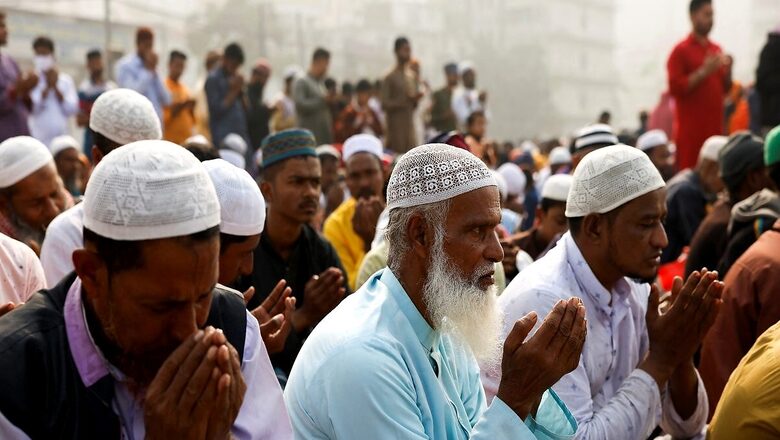
views
One of the Islam’s five pillars is the practice of Zakat, or charity. The donation, which is computed as 2.5 percent of a family’s yearly savings that can be made at any time of the year in cash or in other ways. But the majority of donations are made during the month of Ramzan, as it is believed that good deeds in this month are rewarded with greater benefits.
Zakat is a tool to uplift the downtrodden, to eradicate poverty, and to foster a balanced society. Zakat is the “right” of the poor and the giver must not indicate any sign or feeling of favour. This feature of Islam reduces the gap between wealthy and poor.
According to experts, Indian Muslims spend more than Rs 10,000 crore on Zakat each year. Then why do Muslims find themselves in trying conditions socially and economically?
Over 85 percent of Muslims are Pasmanda backward and unable to meet their basic requirements. So, where are the crores of Zakat money being utilised? Conservatively, we can say that 80 percent of the money is gobbled by the Zakat mafia. They claim that they provide food, education and uplift the underprivileged. However, a large amount directly goes towards their administrators’ lifestyle and radical teachings.
Where is the Zakat money going?
There was a time when madrasas were endowed with Zakat money. But later people realised that their funds were being misused by the management. There was no accountability and the personal properties of the head of the madrasas (mostly Ashrafs) kept growing. This resulted in trust deficit, and good madrasas also got affected financially.
Then came the fake NGOs, which are skilled at stealing Zakat funds and have offices, websites, and payment websites along with their alluring emotional appeals. They display images of giving clothing to slum dwellers, feeding the hungry, assisting the underprivileged, etc.
Strangely, a large number of the Zakat organisations in India are associated with Jamaat-e-Islami affiliates. Since most of the funding comes in the form of hand cash, there is no accountability in these groups.
Social workers in Hyderabad experienced a rift six months ago, when they learned that Youth Welfare Telangana, the youth arm of the Welfare Party of India affiliated with Jamaat-e-Islami, had allegedly appropriated more than Rs 5 crore in funds. Led by Syed Jalaluddin Zafar, they claim to cremate over 3,000 dead bodies during the pandemic. They got recognised by politicians and even got featured in Rahul Gandhi’s Bharat Jodo Yatra.
Muslims donated crores of rupees from their Zakat funds and few organisations came forward and donated four ambulances to Youth Welfare to help the poor patients.
A few months later, some members from the core team left the organisation alleging that Syed Jalaluddin Zafar “ate up” all the funds. When we came to know about this, we asked Zafar directly regarding the ambulances which were donated to help the poor people.
“I am not a backward Muslim from any rural village who came to live in Hyderabad,” he retorted with great arrogance. “I belong to an eminent family having multiple properties. I’m not here to answer everyone.”
This was not the answer to my question. I finally understood how the Ashraaf class under the banner of social services steals money from the Zakat funds and doesn’t let Pasmanda advance.
Inspired by the radical Muslim Brotherhood cult, these organisations have realised the importance of funding. They target the scholars in madrasas and urge Muslims to donate their Zakat only to their organisations. By projecting Muslims victims under the BJP regime, they solicit donations under the pretence of uplifting the community and eat-up the Zakat money.
However, they have actually done more damage to the overall Muslim community than the perceived threat of the BJP and the RSS.
Financial condition of Pasmanda Muslims of Hyderabad
The financial condition of Pasmanda Muslims is extremely bad. For instance, among 44 lakh Muslims who reside in Hyderabad, 60 percent live in slums. The Ashraaf leaders and religious clerics who ruled since Independence have made these Muslims Pasmanda. Today, crime is at the peak in these localities and the children dropout rate of Muslims is the highest compared to other communities.
Shockingly, a recent survey of an NGO revealed that 37 percent of the Muslim women in Hyderabad are the single breadwinners of the families. Among them 43 percent are widows, 22 percent are divorced, and 37 percent are single women abandoned by their spouses.
There have been many incidents in which many young girls from poor Pasmanda families are forced into contract marriage with Shaikhs from West Asia. No help being provided to them by any minority institution nor the Zakat money reaches these deserving poor families.
Zakat management must improvise
We can surmise that the Zakat money is not being used properly and productively for the benefit of the Pasmanda Muslims. Instead, it is being managed in an unsystematic, unprofessional and individualistic manner. It becomes incumbent on Muslims to ponder on this issue and make the maximum benefit possible of their Zakat funds.
Recently, Mumbai-based scholar Kifayatullah Sanabali urged Muslims to give Zakat money to the poor, instead of donating groceries or clothes. The poor have a claim to Zakat, which they are free to use according to their needs. The poor should not be told where to invest their money by the donors. The poor can use it to buy whatever they want, including food, clothing, and schooling.
Charitable and Zakat-based organisations need to be closely monitored. Their top concern should be helping the deserving people, rather than raising money from the Zakat donors.
Modern schooling must also be taught in madrasas. Teachers must be trained to take digital classes which will help the overall development of the students. This action will help in regaining the confidence of madarsa students. In order to educate Pasmanda Muslims both religiously and professionally, madrasas must play a significant part.
If correctly administered, Zakat will be the most effective means of reducing poverty among Muslims. It is a universal system for eliminating perversion, assisting those in need, and reducing the wealth gap between the rich and the impoverished. When utilised properly, the beneficiary of today can become the benefactor of tomorrow.
Adnan Qamar is a social activist, speaker, election strategist and a student of law working for the uplift of Pasmanda Muslims. He tweets under @TheAdnanQamar. Views expressed are personal
Read all the Latest Opinions here



















Comments
0 comment